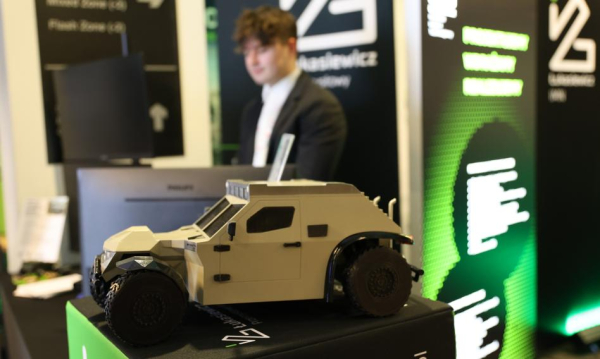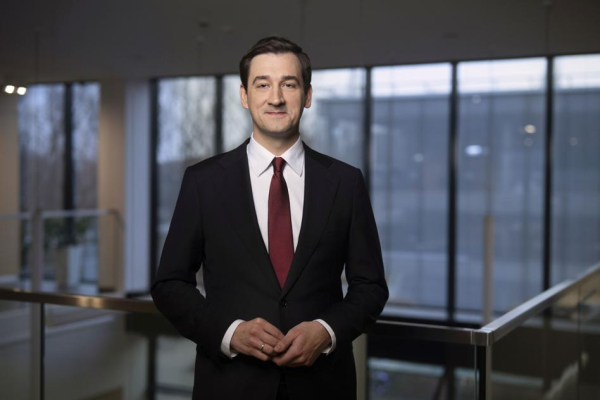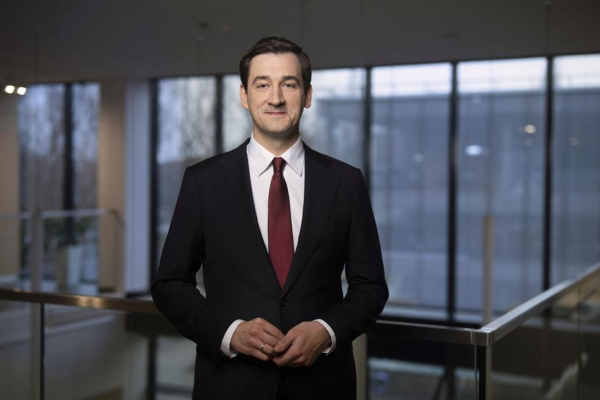From an economic perspective, it’s crucial that we support the domestic business sector in delivering products and services with a technological component to the market, which can be sold at higher margins. This is how we see our role. Considering the level of innovation in our economy, as measured by rankings such as those of the European Commission, this is a serious and ambitious task,” says Dr. Hubert Cichocki, President of the Łukasiewicz Center.


The Łukasiewicz Research Network is supposed to focus on modernization, not groundbreaking innovation. Why this narrowing of ambition?
If we look at economic history, we won’t find the breakthrough innovations previously announced by officials. Innovations arise either as side effects of a business process or as a result of a deep understanding of user needs. In practice, this is the result of risk-taking through trial and error by courageous entrepreneurs or the result of research and development projects carried out for the military. Why is the military a good “supplier” of innovation? Because, on the one hand, we have precisely defined product functionality, and on the other, human lives depend on the implemented process, which also means a motivation to take risks.
From an economic perspective, it is therefore crucial that we support the domestic business sector in delivering products and services with a technological component to the market, which can be sold at higher margins. This is how we see our role. And – considering the level of innovation in our economy, as measured by rankings such as those of the European Commission – this is a serious and ambitious task.
The network comprises 22 institutes. What are the greatest strengths of these scientific entities?
I’m glad you asked about your strengths. To achieve real, implementable innovation, we must invest in areas where we already have significant potential. In military terms, we must redeploy forces to the front where there is a high probability of breakthrough. We accomplished this by creating Łukasiewicz’s first organizational strategy.
We have identified four key areas within our Network around which we coordinate research and development projects. These include defense and security, energy transition and the circular economy, and chemical expertise for industry.
These are four areas where the historical competencies of the institutes incorporated into Łukasiewicz meet projected market demand. Therefore, projects of significantly greater scale and scope must be built around them, only then is there a chance for real innovation.


Dr. Hubert Cichocki has served as President of the Łukasiewicz Center since March 2024. He conducts research on organizational economics and public management at the Warsaw School of Economics. He has held advisory and management positions at the Supreme Audit Office (media materials).
In which areas of this first direction, i.e. security and defense, do you want to get involved?
For defense purposes, we operate primarily in three areas. First, we are developing autonomous reconnaissance and weapon delivery (so-called effectors) on unmanned platforms. The PIAP HUNTeR and Tarantula robots serve precisely these purposes.
Secondly, we are involved in the development of chemical weapons components, which until now have been mainly obtained on foreign markets , and which every NATO country should have in its technological and production range.
The third field is materials engineering . We are beginning a close collaboration with the steel sector. I can’t provide details yet due to confidentiality reasons, but in the coming weeks, we will announce significant projects both here and in the chemistry field.
We realize that in our institutes we can build dozens, but not thousands, of a given solution – hence the strengthening of cooperation with the Polish Armaments Group and other companies in the defense sector.
What goals do you set for yourself in the energy transformation?
Energy transformation is one of the most important challenges facing Poland and Europe today. We are grappling with grid instability, exacerbated by the growing share of distributed energy sources, including renewable energy. The blackout in southern Europe demonstrated how high voltages can limit installation efficiency and compromise the security of power systems.
Given these challenges, we plan to utilize Łukasiewicz’s infrastructure for both testing and certification, based on smart grid principles. Our ambition is to implement technologies that allow for better energy balancing and reduced losses.
However, the biggest challenge for businesses today is the high cost of emissions. We offer solutions specifically targeted at businesses with high energy consumption, enabling them to manage resources more efficiently and reduce their carbon footprint. We are implementing technologies such as heat recovery and energy storage through new materials and systems integrating various types of energy carriers. We are also actively pursuing new energy carriers, such as hydrogen and ammonia. Our strategy envisages the widespread implementation of circular economy principles, which will give companies a competitive advantage while ensuring energy security.
The final strand is chemistry. Do you see potential for institutes to develop areas related to hydrogen and synthetic fuels?
Chemistry is our strongest asset, also due to the scale of our partners’ operations, such as Grupa Azoty and Orlen. We operate across multiple links in the production chain, from raw materials and advanced materials to industrial implementation.
We emphasize the development of hydrogen technologies. We want research to quickly translate into concrete implementations—from green hydrogen production through microorganism-based processes to its safe transport and storage (e.g., in the form of metal hydrides). We are also working on applications of hydrogen as a storage facility for energy derived from renewable energy sources.
In parallel, we are developing synthetic fuel technologies and advanced catalytic solutions. These directions are of strategic importance both for the automotive industry and, more broadly, for logistics and transportation. Our goal is to increase the efficiency of energy storage and transport to extend vehicle range and reduce operating costs.
How to effectively commercialize research results? Business-science collaboration remains weak in Poland.
Economies with a smaller GDP than Poland, such as Sweden, Denmark, and Belgium, have several times more entities on the list of Europe’s most innovative companies. In this respect, Greece surpasses us in this respect, with a GDP more than three times smaller. It is very difficult to implement innovations and conduct research and development projects in an environment of companies that spend little on R&D.
For technology transfer to materialize, a company with an appropriate scale of operations is necessary, which, due to the nature of its business, requires a technological component. Furthermore, the company must be able to implement this component in the form of investment. Large companies find it easier to invest in development, including technology-based solutions. In this sense, public policies supporting company growth are – indirectly – policies supporting research and development.
How to obtain financing for these solutions?
Łukasiewicz is not a funding agency, but if a company has a business problem, we can propose a technology that will help solve it, and then jointly apply, for example, to the National Centre for Research and Development or European programs.
A report by the Supreme Audit Office shows that PLN 2.8 billion was spent on the Łukasiewicz Research Network’s operations between 2019 and 2024, but these outlays yielded little in the way of significant results. The Office cites, among other things, violations of the Salary Cap Act, a lack of a long-term strategy, and poor commercialization results.
The Supreme Audit Office (NIK) report summarized the historical process that spanned the years 2019-2023. There is no doubt that the process of creating and managing the Network deprived us of key areas of competence, such as foundry engineering (which is now essential to supporting the arms industry).
Today, we are working intensively to rebuild these competencies, while also adding new value in project selection and corporate governance. This work is taking place on two levels.
The first is to make Łukasiewicz an organization governed by corporate governance mechanisms and procedural rules. We have implemented procedures that are standard for such large matrix-type organizations: a strategy, transparent mechanisms for selecting and rewarding managers who find employment with us, as well as principles for selecting projects for the portfolio and those designed to ensure a safe and satisfying work experience, such as anti-harassment regulations and compliance procedures.
The second , substantive level involves selecting the projects we work on. We must focus on a small number of truly innovative ventures that have a chance of implementation. We will only achieve innovative results if we focus on large and complex projects, while simultaneously finding a business partner capable of bearing the investment costs required to implement the technology, thus generating real innovation. It’s impossible to simultaneously conduct hundreds of small-scale projects and expect them to be implemented in the economy.
Interviewed by Michał Niewiadomski